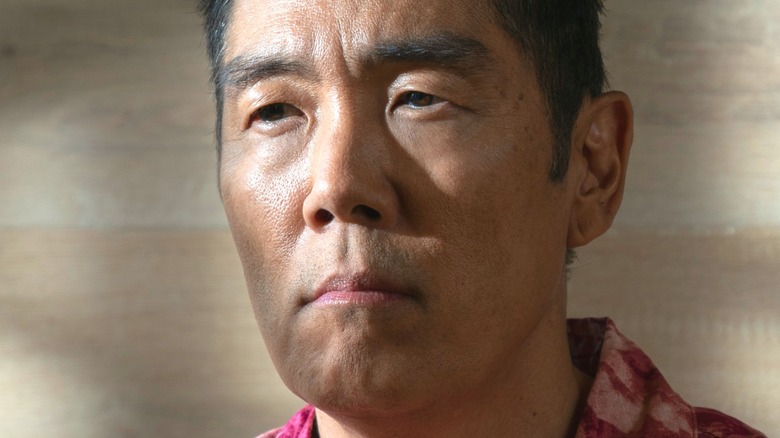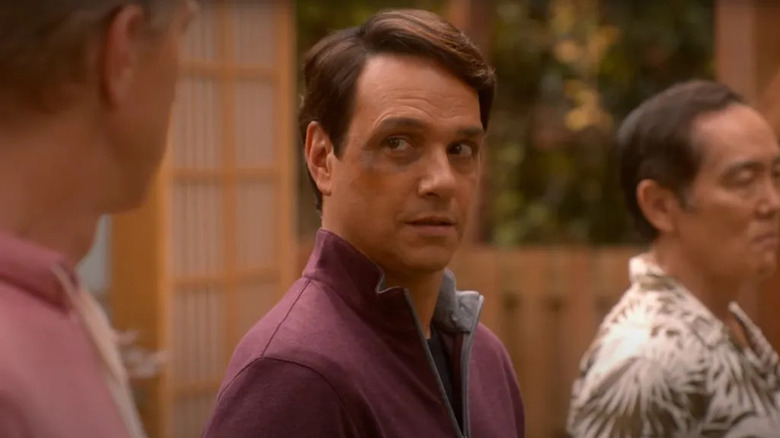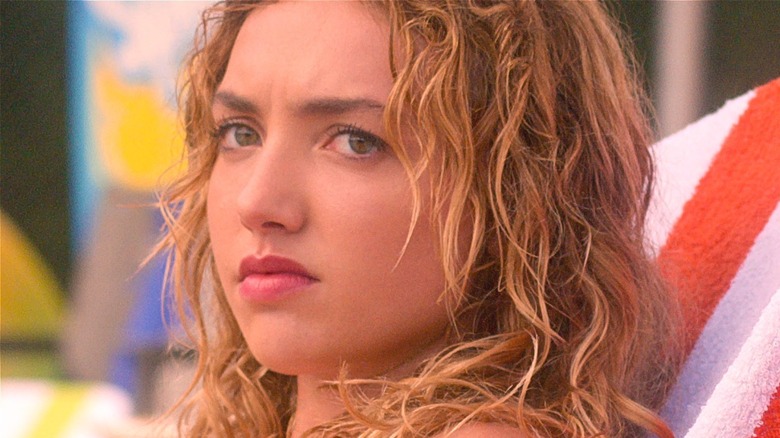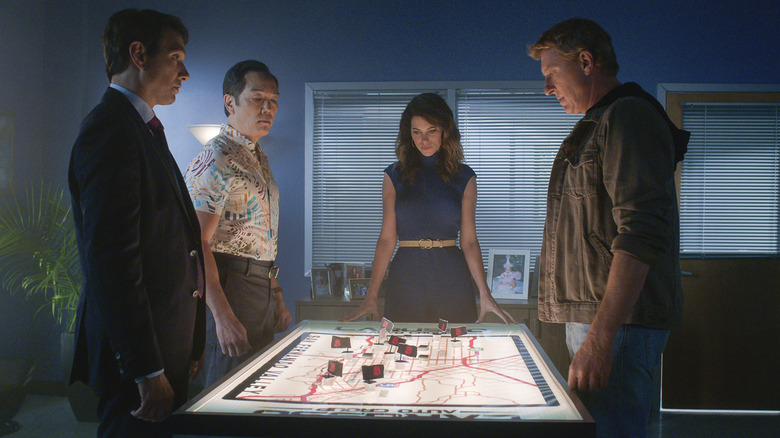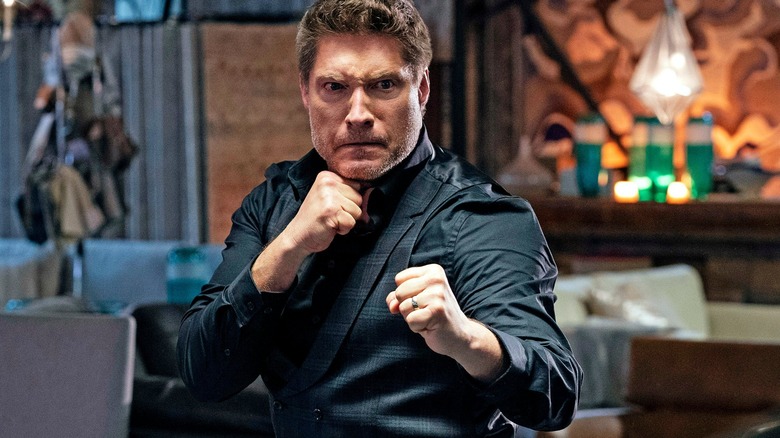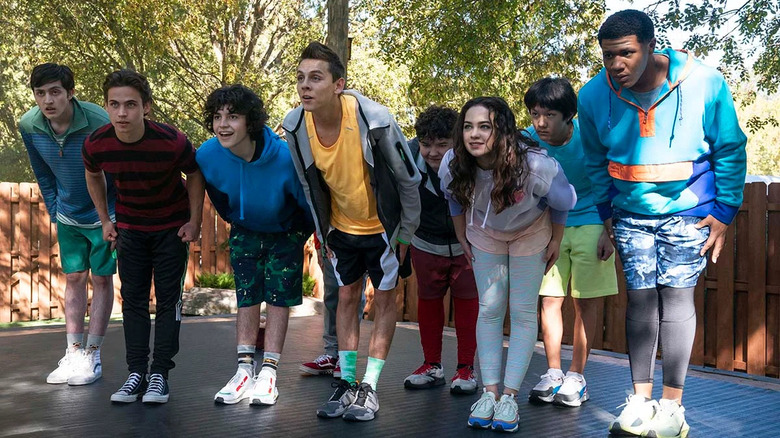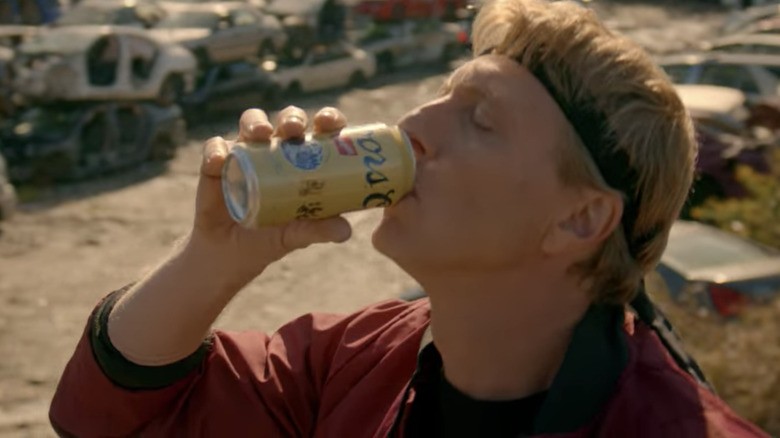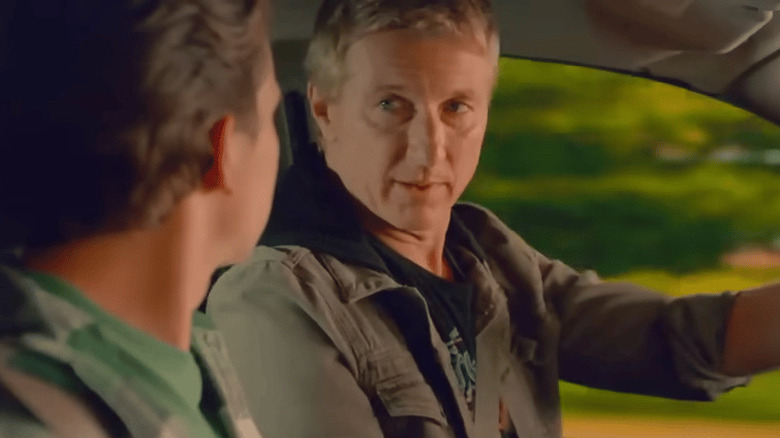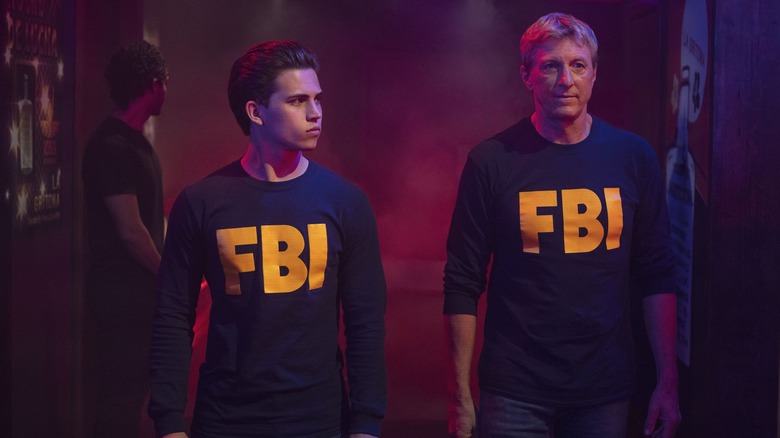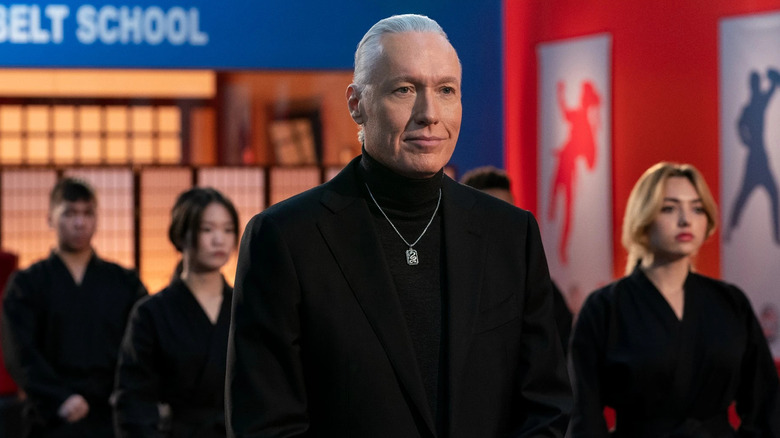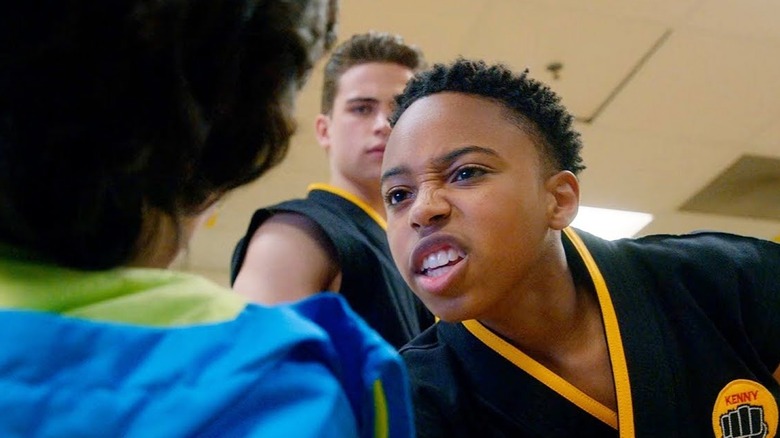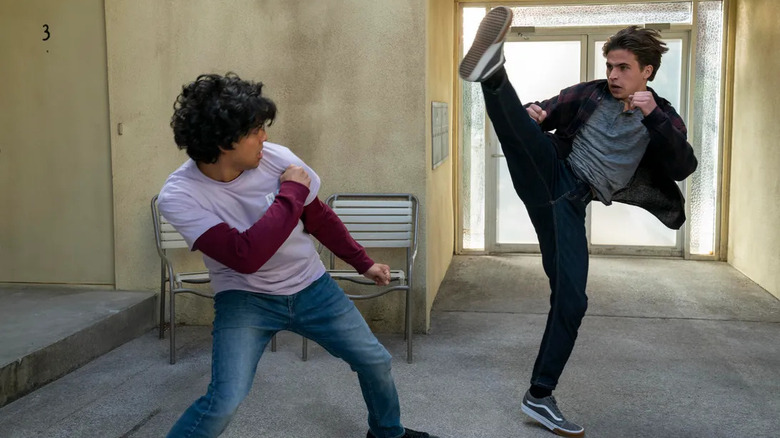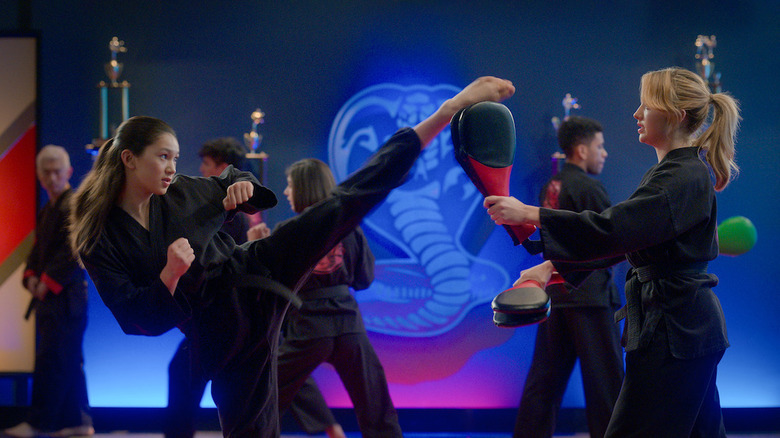The 6 Best And 6 Worst Things About Cobra Kai Season 5
"Cobra Kai" is back for Season 5 with more familiar faces, more serious stakes, and, of course, more fights. This next phase of "The Karate Kid" spinoff series explores rivalries that date back to "The Karate Kid Part III." It hits upon several of the motifs (a sensei's reluctance to train students, bonsai tree metaphors, etc.) in a film which -– unlike the first two entries -– didn't knock out either critics or audiences. So how does the season of "Cobra Kai" that's inspired by it fair by comparison, especially when contrasted with Seasons 1 through 4?
The underdog Netflix series has, by and large, succeeded despite its high degree of difficulty. "Cobra Kai" is like a combination of moves that wouldn't necessarily seem to work in harmony together. Beside its martial arts influences, it also incorporates elements of soap operas, after-school specials, '80s action movies, and '90s or early 2000s Disney Channel teen comedy. The fifth time around throws in a road trip, plus some spy thriller and rom-com.
Fans of the show will find lots to like in Season 5 as "Cobra Kai" stays true to its own roots and remixes parts of "The Karate Kid Part III" into something that might make audiences appreciate the original a little more. Not every strike lands, however. Like the path of any aspiring karate champion, this new set of ten episodes is full of victories and failures. These are the six best and six worst things about "Cobra Kai" Season 5.
Best: Nostalgia
"Cobra Kai" is a legacy sequel streaming series to a film franchise that began in 1984, which means its returning adult characters — Daniel and Johnny especially — are of an age where they're longing for the good old days, even though their present day is full of action. The show is at its best when it references its past in self-aware ways that also impact the current plots and themes. "Cobra Kai" has been making effective use of flashbacks since its start back in 2018, but Season 5 gives us more fun, winking homages to '80s culture than ever before, and they really add to the series' cheeky but heartfelt vibe.
In one dream sequence, Johnny, Carmen, Miguel, and Robby live out a "Top Gun" fantasy complete with a volleyball game and a t-shirt emblazoned with a fighter jet. Later rendezvous in Mexico and at a waterpark have a decidedly retro teen beach movie feel. The subplot in which Daniel tries to turn Stingray leans hard into '80s geekdom with a "Zelda" tee and an allegorical game of "Dungeons & Dragons."
Later, when Daniel, Johnny, Amanda, Carmen, and Chozen go clubbing, the DJ spins recognizable top 40 tunes from their younger days, and the unmistakable opening bars of "Eye of the Tiger" play when the men end up in a limousine. These nostalgic Easter eggs add texture to the martial arts and melodrama, and they help to ground the older generation in the show.
Worst: Modern references
Shout-outs to vintage cultural touchstones like "Top Gun" and "Rocky" add to the "Cobra Kai" aesthetic, but nods to ubiquitous topics of the modern era have the opposite effect. In theory, they're attempts at humor, but in practice, they can be distracting and off-putting. "Cobra Kai" isn't technically a period piece like, say, "Stranger Things," which fully embraces the '80s in its setting and its style. The show takes place in a contemporary world, but with its vintage source material, old-school story structure, and dramatic score, it feels like a throwback. It's jarring every time a character makes a joke (and usually not so much a joke as a lame aside) about something like Teslas or Targaryens.
There's nothing wrong, per se, with injecting of-the-moment business into a series that is of this moment. The issue is that when "90 Day Fiancé" pops up, it adds nothing. These peppered-in bits of 2020s pop culture don't affect the storyline or character development (with the exception of Robby's enjoyment of "Hot Ones" on YouTube).
Since the references are so random, they date the show in a way that won't age well. In fact, some feel dated already. This kind of comedy writing rarely pays dividends. Hunting for '80s or "Karate Kid" Easter eggs is one thing — just throwing in a joke about what other shows are on TV today is significantly less rewarding for an audience that already knows what life is like today.
Best: Espionage
The cast of "Cobra Kai" promised The Hollywood Reporter that Season 5 would feel like "life or death." To accomplish that, the showrunners had to do more than tear relationships apart and put them back together in different combinations. This batch of episodes revolves around mysteries within mysteries, and several main characters go undercover or employ other spy tactics to figure out what's really going on. All that espionage makes for some of the show's most compelling moments so far.
Episode 2 features two nail-biting exchanges. Miguel tracks down his father Hector and is surprised by him. Rather than the dangerous man Carmen warned him about, Hector is handsome, rich, affable, and generous. When he takes Miguel to an MMA fight, the karate star begins to imagine the life he could've had. However, he's still pretending to be a good Samaritan tourist, which ends up being helpful when their night goes south thanks to Johnny and Robby's Female Body Inspector shirts. We're genuinely concerned for Miguel when misogynist mobster Hector shows his true colors.
In an even better scene, Chozen — posing as a Japanese master who goes by Sensei Joe — accepts Silver's dinner invitation. They match wits over aged whiskey and traditional cuisine. Silver even shows him his private arsenal of swords. Chozen thinks he has the upper hand, but Silver outsmarts him by knowing his stuff. Tory and Kreese have their own double cross going on, and as the season draws to its conclusion, the kids rely on their tech skills to play some spy games that will determine the future of "Cobra Kai."
Worst: Obvious misdirects
"Cobra Kai" is an audience-friendly genre show, so it's not supposed to be too hard for viewers to guess what's coming next. Still, most of the plot twists — even the ones viewers see coming — are pretty satisfying. However, this season has a few tricks up its sleeve that are so obvious, they're groan-worthy. Johnny's purchase of those gag FBI shirts is one. They do create a reason for Hector to flee the club with Miguel, but it's an overly cheesy set up in an otherwise tense scene.
Worse is Daniel and Chozen's plan to recruit Mike Barnes (Sean Kanan reprising his "The Karate Kid Part III" role). The duo from the temporarily defunct Miyagi-Do eavesdrop as Barnes is on a phone call with a client. They overhear him yelling, "You think that scares me?" and "By the time I'm finished with them, they're going to be unrecognizable." He also talks about someone who just "flew in from Japan" (viewers are supposed to think this refers to Chozen) as well as his business with Italians (a mob allusion). Barnes says he will "start by cutting off their legs" before requesting a 50 percent commission. Fans are smart enough to guess this was a misdirect. Daniel's old foe was talking about international furniture sales.
This sort of bait-and-switch happens again when Daniel tries to hitchhike with a dude in a truck. A clown car gang of rednecks exits the vehicle, ready for a fight, just as Stingray shows up to give Daniel the ride he needs.
Best: Good advice
Early in Season 5, Miguel goes to Johnny with girl problems. His father figure and former sensei tells him not to worry because everyone makes mistakes and nobody has to have it all figured out. He assures Miguel that as long as he's honest, he's being a good friend, partner, and person. In response to this wisdom from an unexpected source, a slightly shocked Miguel quips that this was, "Actually some really good advice." Since "Cobra Kai" is so often about the spectacle of staged combat and heightened drama, it's easy to overlook the fact that it occasionally passes on some emotionally healthy platitudes to its audience.
In another scene, Chozen waxes poetic about how, "No one can take honor from you. Only you can take honor from yourself," which might as well be the thesis statement of "Cobra Kai." The combined dojos of Miyagi-Do and Eagle Fang get a lesson in group work during another standout episode in which Chozen provides each student with an egg. Their only goal is to keep it safe from his attacks. On their first attempt, they fall like dominos as not a single one of them is strong enough of their own to defend against the master. However, after he motivates them and reframes the exercise, they prevail.
Chozen says that while Silver's multiplying branches of Cobra Kai might be a mile wide, they're only an inch deep. Conversely, their nameless dojo may only be an inch wide, but their commitment to each other is a mile deep. The life lessons Daniel, Johnny, and others impart on "Cobra Kai" might be schmaltzy — but they're not wrong.
Worst: Product placement
"Cobra Kai" started out on YouTube Red — a service that doesn't exist anymore — and went on to become a reliable hit for Netflix with its third and fourth seasons. Still, streaming services have to make money somehow, and subscribers only pay some of the bills. Product placement is a common way of raking in extra advertising dollars, especially when shows don't have the luxury of commercial breaks. "Cobra Kai" has gotten less and less conspicuous about its sponsored details as its episode count and viewership has grown. This time around, however, it doesn't seem like they're trying to hide those products at all.
Viewers could easily miss the many Nike swooshes, and besides, it is a show about a sport. The same goes for the cars that appear in Daniel's dealership. "Cobra Kai" cuts to labels of drinks and snacks as often as it cuts to dramatic close-ups of its characters' faces. However, two companies really got the marquee treatment this season: Coors and Olive Garden. The pale yellow cans (and boxes) of Coors Banquet beer are literally littered throughout Johnny's story this season. He's always had a preference for the brand, but this season, he uses those logos to craft a poorly conceived escape room.
Sometimes, entertainment properties try to be in on the product placement joke. "Cobra Kai" tries this approach by having Johnny take a warring Robby and Miguel to an Olive Garden, where he talks up their breadsticks. It's all pretty tongue-in-cheek, so it almost works — the key word being almost.
Best: Johnny as a dad-to-be
The foundational parts of Johnny Lawrence's character are that he's not very smart and that he's a bad dad with regrets. Throughout four seasons, we've watched him try to improve his relationship with his actual son, Robby, and his first protégé, Miguel. That arc's been bending toward better quality parenting, slowly but surely, but his journey of self-discovery is put on the fast track when Carmen tells him she might be pregnant. His initial reaction is to try to return his off-brand condoms and to freak out at the sight of another guy strapped into a baby carrier. Classic Johnny. However, the sequence that follows in which he baby proofs his pad with the help of a panic-inducing "What to Expect When You're Expecting" type video is pretty endearing.
A worse version of the show would've had Johnny come to terms with being a father again, only to find out that Carmen wasn't really with child, and a will-they-won't-they have a baby plotline would've stretched out a whole season. Instead, Carmen reveals that, yep, she's preggers, and the blending of their two families (and the endgame of Johnny's character arc) begins in earnest. After Miguel and Robby fight out their differences and begin making amends, it's equally adorable that they're both happy for Johnny and everyone involved when he lets the good news slip.
Worst: Johnny as a bumbling idiot
Let's get back to the leader of Eagle Fang's other dominant trait — cluelessness. The fact that Johnny Lawrence isn't exactly the sharpest samurai sword in the dojo has been one of the longest-running bits on "Cobra Kai." We get it. He's immature, out of touch, drunk a sizable chunk of the time, and he's made decades' worth of poor decisions. Sometimes, Johnny's ineptitude and crudeness earn genuine laughs from the audience. When he assures Robby that the chihuahua dashboard ornament wearing a sombrero isn't racist because they made it and are selling it is one example. Still, this season Johnny's stupidity has been pushed beyond the realm of believability. Nobody is this oblivious.
Johnny is frequently outmatched by technology, but jokes about him not knowing how cellphones work or falling victim to phishing scams are really just cheap shots at age (actor William Zabka is only 56). Similarly, his attempt to take on gig work to make extra money results in a funny enough montage, but he couldn't possibly be so terrible at delivery driving, interacting with customers, and unaware of the impact of one-star reviews. The digs at his intelligence themselves aren't egregious or offensive; it's just that they're all so similar. It's time for "Cobra Kai" to let Johnny Lawrence grow, which, thankfully, the show seems ready to do.
Best: A villainous corporate takeover
To up the ante villain-wise, "Cobra Kai" brought in "The Karate Kid Part III" bad guy Terry Silver last season. He's been promoted to final boss this season and the literal boss of Cobra Kai, now that he outmaneuvered Kreese and got him sent to prison. But this iteration of Terry Silver isn't just evil because he's evil, as he follows a long tradition of villain archetype — the slimy corporate overlord launching a hostile takeover of a whole sector of the Valley's small businesses.
Since John Kreese was the type of complicated character whose demons sprang from his troubled past, Terry Silver is a smart choice to take over the mantle of the antagonist, as we don't have to sympathize with someone who's obscenely wealthy and without scruples. Daniel and Chozen spend almost the entire season trying to figure out what, precisely, his evil plan is. But his plan is hiding in plain sight. He's franchising Cobra Kai using shady buyout contracts and then supplanting their owners and teachers with his minions. Not only will this give him exclusive access to "corporate sponsorships" and "broadcast rights," every kid who wants to take karate will have to follow in his morally ambivalent footsteps.
What's really despicable about his motives is that when he yammers on about legacy, he means it. This survival-of-the-fittest extreme capitalist is winning at the game as he understands the rules. In an era in which faux-philanthropic uber-powerful CEOS are homogenizing American towns and cities, Terry Silver is a pitch-perfect boogie man.
Worst: Gross out humor
"Cobra Kai" can be surprisingly sweet and sentimental for a show that's ostensibly about karate. Still, it can turn nasty on a dime, and given the series' TV-14 rating, some edginess is expected. Occasionally, profane language or off-color humor can seem unnecessary since, in a broad sense, the show seems designed to appeal to a younger audience with its tween and teen characters. However, since "Cobra Kai" is also about its midlife crisis-aged characters, it can be as alternatingly tame and risqué as it desires. Usually, the show manages to walk the line between titillating and offending, but occasionally, attempts at both fall far short of good taste.
Johnny is responsible for the first of this season's two gross-out moments during his disastrous stint as a ride share and delivery driver. It's shameful and irresponsible enough that the show implies he's drinking while driving (on the job, no less), but he takes things to a vile new level when he relieves himself in an empty Coors can with a passenger still in the backseat of his car.
More vomit-inducing is the hazing incident to which Anthony is subjected. Kenny and his Cobra Kai compatriots, who've been all but brainwashed by Silver into believing there is no such thing as bad behavior so long as you come out on top, take hold of Anthony and drag him into a bathroom. A not-quick-enough shot of an unflushed toilet signifies what's about to go down. Poor Anthony ends up not just viciously bullied but with a new, crass nickname. Ew, "Cobra Kai." Ew.
Best: The fights!
Shows about kids come with built-in issues. To begin with, the actors often age in real life faster than they should on the show, but the young cast getting older is an advantage for "Cobra Kai." It means the series — which is, first and foremost, a vehicle for cool martial arts fight sequences — can choreograph more skillful and visually interesting sparring scenes. Season 5 features too many such moments to list here, but there are highlights worth singling out, and in general, the action set pieces vary in size, scale, participants, scenery, and tone.
Johnny and Robby take on the surfer scam artists that had previously conned Miguel out of his travel money in a fight that has a colorful setting and a lighthearted, early-in-the-season feel. Robby and Miguel's supervised sparring session is both emotional and athletic while providing the perfect way to put these two — who've been diametrically opposed since Season 1 — finally on the same side. The duel between Chozen and Silver that brings back the latter's priceless sword collection is as edge-of-your-seat as anything "Cobra Kai" has done yet. The serene set combined with the severity of the looks the adversaries give each other, plus the use of deadly weapons, pushes the boundaries of the type of violence audiences are used to seeing on the Netflix show.
Though this season doesn't focus as much on the dojos themselves, the finale is practically one big battle between an allied Miyagi-Do and Eagle Fang up against Silver's franchised Cobra Kai. For fans who turn on the Netflix hit for the karate, "Cobra Kai" Season 5 delivers.
Worst: Unnecessary drama
To keep characters as part of the show after they've been given villain arcs, "Cobra Kai" has to do more than its fair share of redemption. To keep relationships interesting, the series has to throw obstacles in the way of friendships and romances. Usually, those obstacles would be easily overcome if only the people involved had a conversation that lasted more than two or three interrupted lines of dialogue.
At least Robby and Tory break up for a concrete reason. She wants to stay at Cobra Kai and he doesn't. Real teens have parted ways over less. Sam and Miguel's breakup is more of a stretch. After he looks for himself in Mexico, she decides that she needs to look for herself through an "Eat Pray Love" style separation. The split-screen scene in which their friends attempt to guide them via texts is charming and relatable, but it feels like the season is just spinning its wheels on the Sam and Miguel front, putting awkward distance between them until it's time for them to reconnect.
Platonic relationships suffer from questionable strains, too. Robby's efforts to convince Kenny that Cobra Kai won't bring out the best in him fall flat, mostly because he doesn't offer any evidence. Nor does Tory when she tries to get Devon out from under the thumb of intense new sensei Kim Da-Eun. Corny showdowns at the waterpark are one thing — that's the kind of manufactured drama fans expect from "Cobra Kai." Still, low-stakes problems and inconsequential misunderstandings are missed opportunities.
